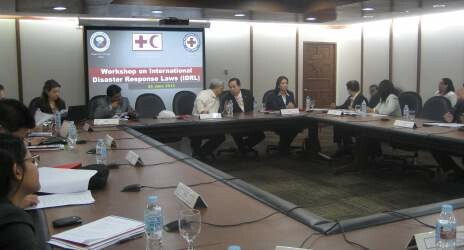
The workshop examined the roles and responsibilities of different governmental departments in managing international assistance and familiarized participants with core aspects of international disaster response laws, rules and principles (IDRL), in particular the Guidelines for the Domestic Facilitation and Regulation of International Disaster Relief and Initial Recovery Assistance (also known as the “IDRL Guidelines”).
DFA Director Jose Brillantes emphasized that, as a matter of pride and principle, the Philippines sought first and foremost to rely on its own national capacities to respond to disasters. Nevertheless, international help would sometimes be needed and he drew attention to national law provisions referring to the IDRL Guidelines, and encouraged participants to consider how to apply the IDRL Guidelines and other relevant international instruments to the next disaster situation.
“The Philippines are among the top-five worst affected nations in the region,” noted PRC Chairman Richard Gordon, and all relevant actors must therefore “work together as a ‘symphony’ to overcome challenges.” Gordon asserted that the Philippines should aim to be a leader and example when it comes to managing international assistance, and provide a model of law “not in form, but in substance.”
Minister Gary Domingo from the DFA, and Mr. Eugene Cabrera from the Department of National Defence further expended on the Philippines’’ experience in receiving international disaster assistance. Both underlined the necessity of having workshops such as this one to reflect on the current legal framework and find room for improvement and further development. Mr. Cabrera, when presenting the Philippines law for disaster risk reduction and management (Republic Act 10121), highlighted the efforts made to transform what once was a reactive law into a proactive law for preparedness.
Participants also had the opportunity to engage in open discussions regarding the national legal framework for disaster response, in order to debate how to move forward and improve national legal preparedness. A roadmap for future actions was developed as well as an agreement with the PRC and IFRC to initiate an in-depth IDRL study in the Philippines later in 2012.